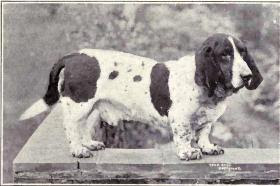When we got the original circular from HQ asking us not to include "beauty" classes in any official RSPCA fun dog shows I must admit I was apprehensive that it could be used against us. Of course if we did run classes where "cute" appearance was the main criterion, that could be used against us too.
I'm not entirely convinced that the real problem with show dogs is judging by appearance so much as judging by distorted ideas of what is desirable appearance.
This picture is a modern Basset hound.
This is one from 1915.
The older dog is much less exaggerated and has more normal back legs and less folded facial skin. That's no guarantee that he didn't have ectropion or any of the other ills that plague some pedigree breeds, but I can't help thinking that selecting for dogs that looked more similar to him would be likely to improve the general fitness of Bassets.
I'm afraid we are seeing a pattern here.
The RSPCA is fundamentally a charity which provides services for animals (welfare law enforcement, veterinary treatment, rehoming etc.) and also campaigns on issues which affect animal welfare.
It's the services which make the campaigns credible: people with frontline experience of animal welfare work are likely to know what they're talking about and people who are putting unpaid effort into practical ways of improving animals' lives must genuinely care about animal welfare. The size and unified nature of the RSPCA probably impresses politicians with the likelihood that we're backed by substantial numbers of citizens with votes, but to some extent that's a secondary consideration.
Because of this credibility, virtually any person or organisation which wants to affect animal issues (whether to achieve change or prevent it) sees the RSPCA as a gatekeeper: government is likely to believe us if we say there really is a welfare problem, but it will also believe us if we say things are more complicated than other animal campaigners think. Many people who genuinely care about animals but have an overwhelming concern for one area, such as animal experiments, or factory farming, see us as the only thing which is stopping them from succeeding, because we're not giving unqualified support to whatever it is they want.
Add on those, like the kennel club, or foxhunters who see us as the organisation with enough clout to stop them going on doing what they like, and the result is that threats to our ability to provide the welfare services are used as blackmail to change the welfare policy. This is the, "I'll never give the RSPCA another penny and I'll tell all my friends unless you .... (abolish fox-hunting, bring back fox-hunting, say pedigree dogs are healthy, say pedigree dogs should be abolished—fill in the blank to taste)" route.
On top of this, we're never going to be able to provide the service level many of the public expect, so we have a constant background of genuine complaints plus spurious ones from people who are aware that the most effective way to strike at the RSPCA is to hit our ability as a service provider. None of this is helpful when we need to recruit volunteers to work at the fairly mundane jobs that are essential to keeping the services going.
I'm afraid we are seeing a pattern here.
The RSPCA is fundamentally a charity which provides services for animals (welfare law enforcement, veterinary treatment, rehoming etc.) and also campaigns on issues which affect animal welfare.
It's the services which make the campaigns credible: people with frontline experience of animal welfare work are likely to know what they're talking about and people who are putting unpaid effort into practical ways of improving animals' lives must genuinely care about animal welfare. The size and unified nature of the RSPCA probably impresses politicians with the likelihood that we're backed by substantial numbers of citizens with votes, but to some extent that's a secondary consideration.
Because of this credibility, virtually any person or organisation which wants to affect animal issues (whether to achieve change or prevent it) sees the RSPCA as a gatekeeper: government is likely to believe us if we say there really is a welfare problem, but it will also believe us if we say things are more complicated than other animal campaigners think. Many people who genuinely care about animals but have an overwhelming concern for one area, such as animal experiments, or factory farming, see us as the only thing which is stopping them from succeeding, because we're not giving unqualified support to whatever it is they want.
Add on those, like the kennel club, or foxhunters who see us as the organisation with enough clout to stop them going on doing what they like, and the result is that threats to our ability to provide the welfare services are used as blackmail to change the welfare policy. This is the, "I'll never give the RSPCA another penny and I'll tell all my friends unless you .... (abolish fox-hunting, bring back fox-hunting, say pedigree dogs are healthy, say pedigree dogs should be abolished—fill in the blank to taste)" route.
On top of this, we're never going to be able to provide the service level many of the public expect, so we have a constant background of genuine complaints plus spurious ones from people who are aware that the most effective way to strike at the RSPCA is to hit our ability as a service provider. None of this is helpful when we need to recruit volunteers to work at the fairly mundane jobs that are essential to keeping the services going.


No comments:
Post a Comment